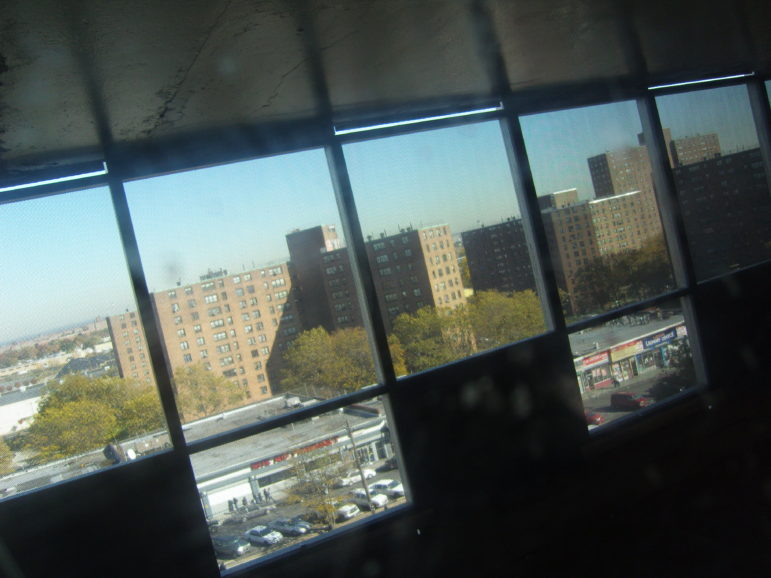Proposals from candidates for mayor and district attorney would bring new levies on Wall Street, residential parking permits, solar panels on NYCHA roofs, and more.

Jarrett Murphy
Roofs at the massive Castle Hill NYCHA complex in the Bronx. Mayoral candidate Andrew Yang wants to put solar on all 2,252 roofs in the public-housing system.The Policy Shop offers snapshots of the more intriguing policy offerings by candidates running for office in the 2021 elections.
A sweeping pledge to decarcerate
Most candidates for Manhattan district attorney are proposing ambitious reforms to how that office approaches crime and punishment, but candidate Tahanie Aboushi last week proposed a decarceration policy that is sweeping in breadth.
“We will fundamentally change the office from its current approach of convicting at all cost and instead focus on identifying and declining cases whenever possible, and offering alternatives to incarceration through community-based restorative approaches that improve accountability and healing,” she wrote.
She promised never to prosecute a list of crimes including possession of a controlled substance, sale of a controlled substance, escape and resisting arrest. She also committed to adjourning in contemplation of dismissal—even for repeat offenders—arrests on another list of crimes that includes criminal possession of a firearm, second-degree assault, code violations for possession of rifles or shotguns, misdemeanor driving while intoxicated and second-degree robbery. What’s more, she promised that she will offer an “appropriate” alternative-to-incarceration programs “in every case—no exceptions,” which would seem to include top-level felonies. And if someone fails to adhere to that program? “So long as a person remains willing to continue working in any program, we will never give up on them,” Aboushi wrote.
From 2010, the first year that incumbent district attorney Cy Vance was in office, to 2019, arrests in Manhattan fell by nearly half. In 2017, the last year for which data was available, courts disposed of 44 percent of cases at arraignment—the highest rate in the city.
Targeting human trafficking
Another Manhattan DA hopeful, Lucy Lang, pitched a crackdown on human trafficking. Her plan includes expanding on the office’s existing Human Trafficking Response Unit, and expanding its focus to include both sex and labor exploitation. Lang also wants to build out the services the office can offer to survivors of trafficking, including stronger advocacy to get U- and T-visas for them. She also vows to pursue expunging survivors’ records of crimes associated with their exploitation, and also aims to resentence survivors convicted of crimes where their experience as trafficking victims was a “significant contributing factor.”
Her proposal notes that “children are especially vulnerable during the COVID-19 pandemic: online schooling and limited social interactions make it harder for parents and teachers to detect predatory behavior online.” Lang says she will “create a coalition of DANY’s cyber crime experts, human-trafficking experts, and outside advocates to proactively work to stem the flood” of child sexual abuse materials.
A Green New Deal for NYCHA
Mayoral candidate Andrew Yang is pledging to put a segment of the city’s housing stock that is often left behind—the 170,000 public-housing apartments—and put it on the leading edge of the city’s move toward decarbonization.
He wants to end the use of gas in all NYCHA buildings and get all electricity from renewable sources, a move that could get the housing authority to zero emissions by 2030. For that to work, NYCHA buildings would need to get much more efficient, so Yang wants “deep energy retrofits such as upgrades to windows, the building’s outer cladding and its core energy systems” including “appliance upgrades such as heat pumps, new stoves, leak-proof low-flow toilets, and new fridges”—the latter two items are something NYCHA is already working on. Putting solar panels on every NYCHA roof by 2030 will also help. An added benefit is that the work could employ thousands of NYCHA residents if they get the necessary training—to which Yang commits.
The hitch is that the federal government, which has shorted NYCHA on operating and capital funding for many years, would have to pay for it. Says his campaign: “A Yang administration would use its deep relationships in Washington, DC, to secure at least $48 billion in funding to cover all capital needs at NYCHA and realize the tangible goals of a Green New Deal.”
Yang is linking the green infrastructure piece to other NYCHA reforms, like expanding the authority’s board of directors from the current seven members (three of whom are residents) to 11 members, including six residents. He also wants a permanent anti-mold ombudsperson at the agency. And he says he will bar any “luxury development” on NYCHA property and put any proposed development on NYCHA through the city’s land-use review process.
Taxes top Wiley’s Albany agenda
While Mayor Bill de Blasio’s difficult relationship with Gov. Andrew Cuomo feels like something out of a Greek tragedy, mayors often struggle to keep Albany off their back and in their good graces. Rudy Giuliani and George Pataki weren’t always bosom buddies, and Mike Bloomberg saw the legislature kill his Jets stadium and his congestion pricing plan, among other things. So, it’s wise for mayors to map out what they want from the powers upstate, and how they will get it.
Democrat Maya Wiley announced one part of that equation on Monday with the release of her “Albany agenda,” which includes seven new or increased taxes, a list of funding needs, parole reforms, election-policy changes, an end to sole reliance on the specialized high-school admissions test, a “good cause” eviction law and the complete elimination of “major capital improvements” in rent-regulated housing.
Of course, articulating one’s desires is one thing, while having a plan to actually secure them is another, especially in Albany. Wiley does base most of her requests around existing legislative proposals, suggesting there is already some support for what she wants in the capitol.
Garcia pushes ‘complete streets’
Mayoral candidate Kathryn Garcia wants more dedicated bus lanes, permanent Open Streets and a pilot program for residential parking tickets as part of a broad set of proposals on transportation and public space. Among her commitments: creating Complete Streets in all five boroughs “that prioritize pedestrians, bicyclists and public transit riders alongside sustainable infrastructure and community uses,” regulating delivery companies like Amazon and supporting “micro-mobility options for the first/last mile of multimodal transit trips.”
She wants more bike parking and bike lanes, broader use of cameras to catch traffic scofflaws and to convert school buses and city vehicles to electric, among things. And she pledges to build more accessibility into the MTA with elevators and other enhancements. In broad form, the ideas could find many fans among transportation advocates and others, but the devil will be in the degree (how many new select-bus-service routes?) and the location for ideas like a pilot program for “residential parking permits for low emissions vehicles to make on-street parking a privilege, not a right.”









